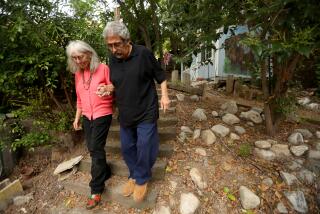Still Joyful Despite Pain of Alzheimer’s
- Share via
The doctor surprised me. We were talking about Alzheimer’s disease and he started talking about joy.
Joy? I said.
“Yes,” Paul S. Rhodes said. “Experience has taught us that even people with advanced states (of Alzheimer’s) are capable of experiencing joy and contentment. Most patients with Alzheimer’s are not significantly depressed.”
I wanted very much to believe him. Anyone who has lived with an Alzheimer’s patient knows how terrifying the disease appears to be.
“That’s because observers are responding to their own sense of imagined loss,” Rhodes explained. “We look at an Alzheimer’s patient, and we imagine how we would feel if we were so afflicted.”
But the patients don’t necessarily feel that way? I asked.
“Human beings are incredibly inwardly resourceful,” Rhodes said. “Even under great adversity, many, many people are able to maintain buoyancy and find important moments of joy.”
Are you telling me that people with Alzheimer’s can actually be happy? I asked.
“Yes,” the doctor said, “they can.”
Alzheimer’s is a disease that affects the brain. People lose their memories--not just the ability to recognize a spouse or a child, but even the ability to remember what a fork is used for or how to distinguish between real people and TV images.
It is the fourth leading cause of death in adults after heart disease, cancer and stroke.
More than half of all persons in nursing homes today are there because they have Alzheimer’s or related disorders.
The longer you live, the greater your chances are of developing Alzheimer’s. It is more common in women, but that is simply because women live to older ages in our society.
There is no cure, but there is no reason to lose hope.
In a small but significant number of patients, for example, the dementia is reversible. It may be caused by a particular hormonal or vitamin deficiency.
Dementia, by the way, is a term doctors throw around a lot when talking about Alzheimer’s. You shouldn’t let it scare you.
“Dementia is the term that physicians use to describe a significant decline of intellectual functioning of such severity so as to substantially interfere with daily functioning,” Rhodes said. “There is an enormous difference between normal, minor memory deficits that we all experience after age 40 and those imposed by dementia.”
One very important thing that can be done for Alzheimer’s patients is to teach care-givers (family, friends and professionals) how to create an atmosphere that helps the patient.
“You can establish an Alzheimer’s-friendly environment,” Rhodes said. “This is one that does not impose unnecessary demands or expectations. It is an atmosphere that capitalizes on the patient’s remaining strengths and resources.
“This is not poetic idealism. There is a difference between a patient screaming and one sitting comfortably with a smile or laughing and hugging.
“And that difference may be due to how the care-giver, professional or family, has approached that patient and what he or she has said.”
How do you learn such things?
The Alzheimer’s Assn. will help teach you. It will put you in touch with support groups. It will give you advice over the phone.
“Countless health professionals and families applaud the voluntary work of the Alzheimer’s Assn.,” Rhodes said. “It provides for education programs for family care-givers and an information help line, staffed by volunteers who have had loved ones with Alzheimer’s.”
Alzheimer’s can be a frightening disease--both for the patient and the care-giver. But it doesn’t have to be.
“It is very important,” Rhodes said, “for the physician to recognize the family care-giver as his or her patient as much as the Alzheimer’s patient. It is often older women, often a sister, a daughter-in-law, sometimes even a mother, caring for demented patient.
“The vast majority of care for Alzheimer’s patients is provided at home and not in nursing homes.”
No matter what your age or family situation, Alzheimer’s disease is something you ought to educate yourself about and for one very good reason:
None of us is getting any younger.






